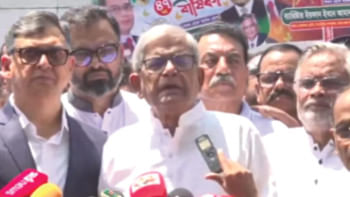Clinton's travails in a maze
US Secretary of State Hillary Clinton has been busy to say the least. She has just finished extended trips that have seen her having discussions with the leaderships of Japan, China, Indonesia, Egypt, Palestine, Israel, Turkey, Belgium, Russia and the Nato. Her entire effort appears to have been directed at listening in and explaining the Obama administration's approach to the many prickly foreign policy issues that confront today's US State Department.
As expected, the agenda appears to have included dipping into the muddy quagmire of Middle East peacemaking and trying to find least common denominators towards a 'comprehensive' Arab-Israeli peace. There have also been efforts towards finding constructive areas of engagement with post-Georgia Russia (by hitting the 'reset' button) and ascertaining views as to how to move the global economy forward despite the lingering international financial crisis.
Her visits have quite correctly been described as a form of 'testing the waters.' This has also been interpreted as an extension of President Obama's campaign promise to engage rather than isolate protagonists as had been the feature during the Bush administration's tenure.
This decision has added interest and brought forth the prospect of inter-active relations in international affairs as opposed to unilateral diplomacy. This has already been reflected in the context of Syria. US envoys are at work exploring better ties with that country as part of an expanded Arab-Israeli peace.
This innovative approach was also evident in her remarks at Brussels's Nato Headquarters. We also saw the new US administration's first public overture towards Iran by inviting Tehran to the latest Conference on Afghanistan. This has been followed by President Obama's recent initiative with regard to this country.
This positive element with regard to Iran has also been noticed in recent clarifications made by Mr. Dennis Blair, US National Intelligence Director with regard to presence of 'highly enriched uranium' in Iran. It may be recalled that a few days earlier some controversy had been generated through comments made by US Admiral Mike Mullen, Chairman of Joint Chiefs of Staff and Israel's top intelligence official Amos Yadlin. Both of these senior officials had hinted that Iran had enough 'fissile material' to make an atomic bomb and had also 'crossed the technological threshold.'
Some Palestinian analysts have however not found any encouraging elements in Clinton's policy towards their issue of establishing an independent Palestinian State.
I am sure that Clinton understands that the recent attack on Gaza and the emergence of a more hawkish attitude within Israeli domestic politics has made the political scenario, regarding Palestinian statehood, that much more complex than before. Matters have further exacerbated because of renewed Jewish settlement expansion in the occupied territories and the razing of homes in Arab East Jerusalem.
The 'unlawful' attitude of Israel in employing discriminatory municipal and security policies against Palestinian residents in East Jerusalem has already been acknowledged by the European Union. Clinton, in her news conference in the West Bank was only mildly critical of Israel.
At the same time the Arab leadership also needs to promote greater functional understanding and cooperation within the different factions in Palestine so that there is accountability in governance within that territory. Hamas needs to also re-think their views and be more pragmatic to achieve the eventual objective.
Those responsible for policy formulation and decision-making in the USA, Europe, Israel and the feudal Arab countries must understand that the best way to combat militancy and instability in this important strategic region would be best achieved by helping the impoverished Palestinians realising their dream. It will require greater political will on the part of Israel.
It has been announced that President Obama has decided to remove all US combat troops by the end of August 2010 and all troops by the end of 2011. Any success in sticking to this ambitious time frame will however depend on the prevailing situation inside Iraq as well as continued stability in Iran and South East Turkey. This equation is still quite delicate and will need careful handling.
Secretary Clinton has many things on her plate. The issues will include strategic re-think over future Russian participation in Central Asia and Eastern Europe, possibilities within Nato, re-planning about the eroding governance structure in Afghanistan and Pakistan and solution of the problem in Cyprus.
Latest developments in the bordering regions of these two neighbouring countries have strained US relations further. Absence of secure, new and safer supply lines for Nato troops has also endangered their continued presence in Afghanistan. There is also the issue of deteriorating India-Pakistan relations at a time when India is going to have another general election.
Clinton has, till now, suggested that during her watch, she will try to have a more meaningful, participatory engagement with the rest of the world. We look forward to such an initiative.

 For all latest news, follow The Daily Star's Google News channel.
For all latest news, follow The Daily Star's Google News channel. 



Comments